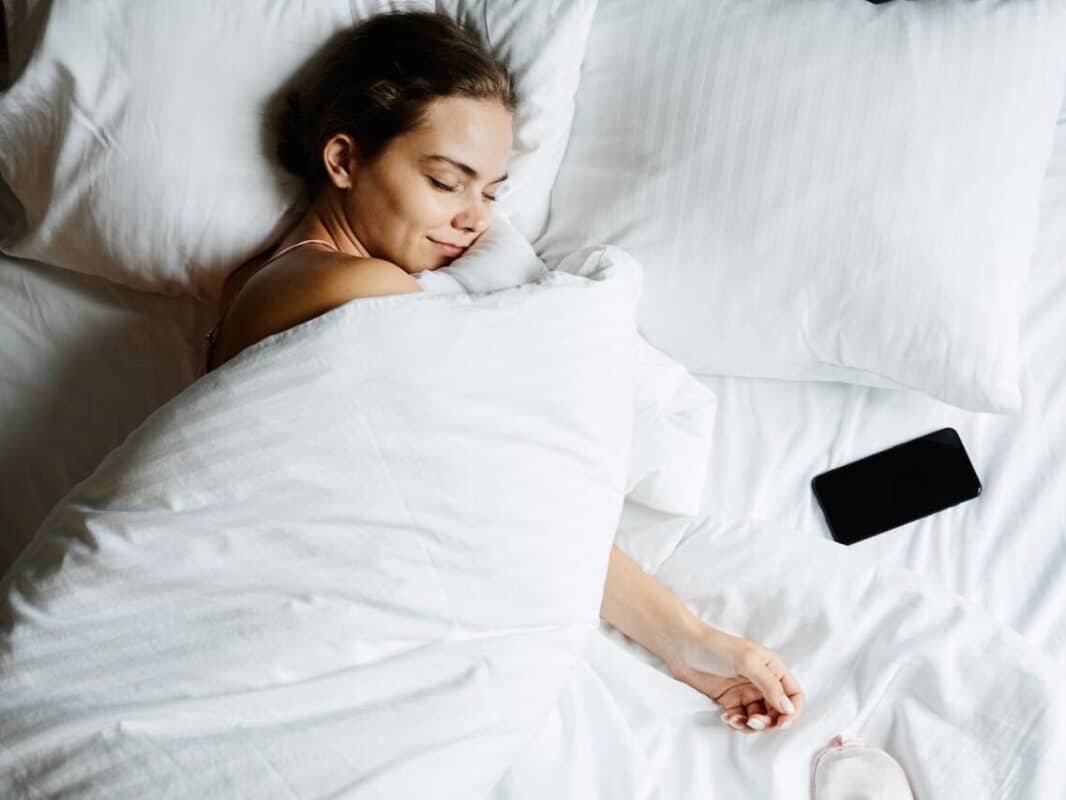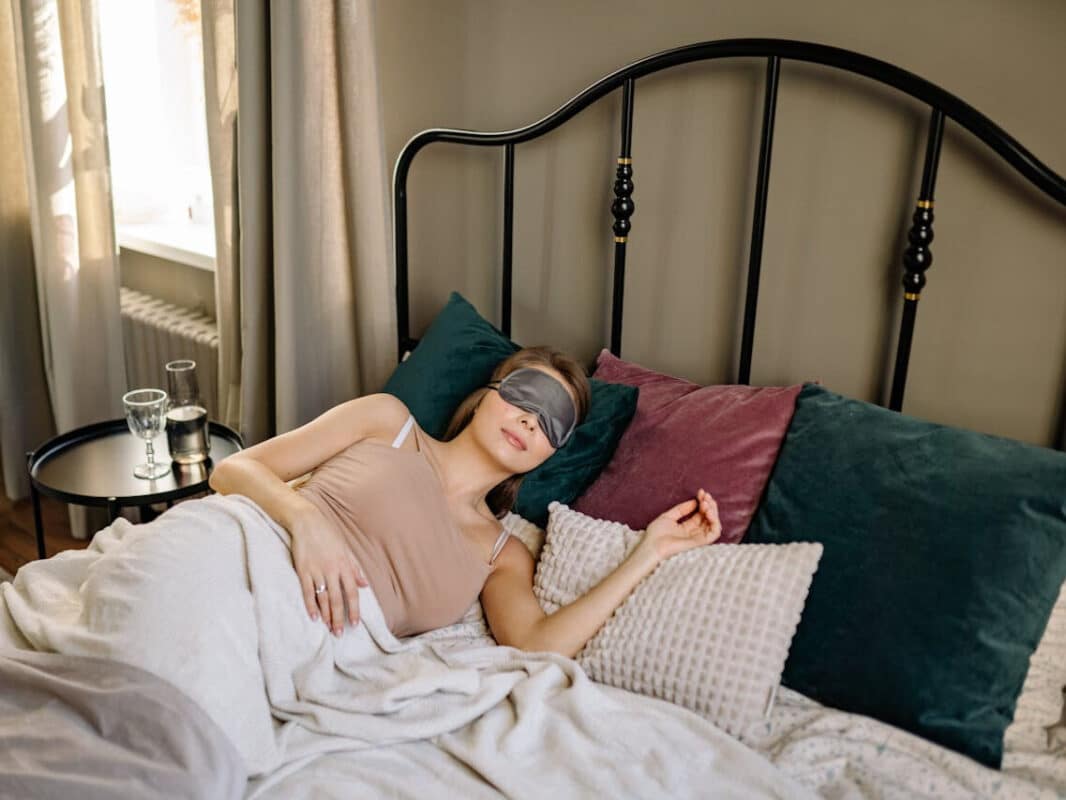
Do you dream of skipping out of bed with a smile on your face? Or is getting a good night’s sleep a lost cause, relegated to the carefree BC (before children) days? Improved sleep quality doesn’t need to be the privilege of a lucky few. We all need it; we can’t cope without it, and we are of little use to our children or ourselves if we are lurching from one latte to another in order to function.
So, if you’re clutching your pillow in desperation, take heart: there’s help out there. These tried and tested tips can help you reclaim quality me-time in the form of restful, refreshing sleep.
Sounds heavenly? Keep reading.
Further reading: 10 Sleep supplements for the best night's sleep ever.
How to improve sleep quality in 10 ways
Aim for quality of sleep, not quantity of sleep
If you’re seriously sleep-deprived or even feeling a little fuzzy, the problem is not the amount of sleep but the quality. A few hours of restful sleep is better than 8 hours full of sleep disruptions. Factors like eating too soon before bed, light or noise disturbance, and room temperature could be interrupting your sleep at night. Ear plugs, sleep masks, and eye covers are a quick fix.
Boost your melatonin naturally
Melatonin is a hormone that regulates sleep-wake cycles. You can boost your production of melatonin naturally by reducing exposure to artificial light in the evening.
I know that as soon as the children are tucked up, we dive onto our screens to send an email, finally finish that report, or check our Facebook feed. Don’t! Have a cut-off time and be strict with yourself. Any WiFi activity or blue light from computers, mobiles or TV screens sends a wake-up call to our brains and bodies. Exactly the opposite of what we should be doing. That said, there are also some great insomnia apps that help you get a healthy sleep.
Fall asleep faster with proper sleep habits
Sadly, there’s no one to read us a bedtime story or tuck us in, though audiobooks could be a substitute! Yet, that doesn’t mean you can’t take time to create your own sleep schedule. Do not underestimate the power and role of sleep hygiene. Think of a warm bath with candles, followed by a pyjama shuffle around the house while switching down all the lights. It could also be a sip of chamomile tea on the sofa (in the semi-dark, of course) or opt for a few pages of light reading.

Do exercise (the right type)
Regular exercise is great for boosting our natural serotonin levels, which contributes to quality sleep. However, practising your Jane Fonda or Beyoncé booty moves within an hour or two of bedtime can have the opposite effect. Instead, a few gentle stretches or yoga is the way to go in your PJs. Regular meditation will help improve the overall quality of sleep by calming your mind and body. Remember, you’re giving your brain cues for what’s to come … think "good night’s sleep, good night’s sleep."
Manage your daytime activities (spend time outdoors!)
Your sleep quality can also be affected by your daytime activities. Regular exercise, ideally in the morning or early afternoon, can improve the quality of your sleep. Avoid heavy meals too close to bedtime to prevent sleep disturbances.
Our bodies have their own built-in clocks, just like how our ancestors used to rely on daylight for work and rest. Today, even though we have artificial light, reconnecting with nature can still boost our sleep. For busy mums, this might seem impossible, but it’s simpler than you think. Just step outside twice a day—first thing in the morning and as you wind down in the evening. This natural light helps signal to your brain that it's time to wake up or relax, it sets you up for a great night's sleep without you even realising it.
Ways to improve sleep quality (cont.)
Prioritise hours of sleep
Aim to keep to a regular bedtime. This includes weekends. Yes, it's tempting to stay up late and enjoy ‘adult time’ until later in the night. I know these moments are rare for us single mums. But beware - it will make it harder to fall asleep by messing with your body’s natural clock. Likewise, waking up around the same time each day is important for a good night’s sleep. You may even find you no longer need the alarm or your beloved snooze button. That's an enormous sleep improvement right there!
Address sleep disorders early
If you suspect you have sleep problems or disorders, such as insomnia, obstructive sleep apnea, or restless leg syndrome, it's crucial to seek help early. Consult a healthcare professional to diagnose and treat these issues. You might need to take sleep medicine to support you with insufficient sleep.
Reserve your bed for sleep and sex
Train your brain to associate your bed with sleep and intimacy only. Avoid working, eating, or watching TV in bed, particularly during the daytime. By reserving your bed for sleep, you'll strengthen the mental connection between your bed and getting good sleep. Once I stopped doing unfinished work in bed, I was able to get to sleep faster!
Drop the caffeine
If a soothing, warm drink is your snooze cue, make sure it’s non-caffeinated. Try switching to herbal tea or dandelion coffee – often, it’s the warmth that we’re looking for! The caffeine kick can help us in the short term. But don’t lean on it all day because even one shot of espresso will make it harder to sleep. Likewise, a nice glass of red may bring on a warm, fuzzy feeling, but alcohol actually impairs sleep quality. Limiting your intake especially close to bedtime, will work wonders for your sweet dreams. And a hangover is certainly one less bedfellow to wake up with.
Understand the stages of sleep
The sleep cycle is made of different stages that help your body and mind recover and rejuvenate. These stages are Light Sleep, Deep Sleep, and Rapid Eye Movement (REM). Each night, you cycle through these stages multiple times, typically every 90 minutes. Getting enough of each stage is crucial for feeling refreshed and alert the next day. Missing out on deep or REM sleep can leave you feeling tired and groggy, even if you spend a lot of time in bed.

Bonus tips to master your sleep hygiene
Optimise your sleep environment
Another crucial factor that causes poor sleep is your surroundings. Ensure your bedroom is cool, quiet, and dark. Invest in a comfortable pillow and mattress; you don't have to endure that back pain anymore. Switch your synthetic bedlinen to breathable, natural fibres. Use blackout curtains or a white noise machine if necessary to help you fall asleep quickly and more peacefully. Minimise clutter! Your bedroom should be a haven, not a dumping ground or multi-media room. After doing these, I guarantee a huge improvement in your sleep quality.
Get out of bed if you can't sleep
If you suffer from insomnia, there is nothing wrong with getting out of bed to break the relentless tossing and turning. Ditch the bedside clock so you don’t keep torturing yourself with glow-in-the-dark numbers. Get up, make a warm drink and do something really, really boring. Like folding laundry or tidying a pantry shelf. Something utterly mundane and repetitive. Don’t be tempted to fire up the computer. I once darned a lace tablecloth at 3 am. I know!! But after doing so, I was able to fall asleep so quickly, and the hole didn’t irritate me at brekkie!
Summary: How to improve your sleep
I cannot stress this enough: sleep is important - it's when our bodies and minds rejuvenate so we're ready to conquer the day ahead. Improving sleep quality might seem difficult, but with a few fun tweaks, you can transform your nights. Plus, it improves your overall health, which means both your physical and mental health.
Start with a relaxing sleep routine to help you fall asleep faster and stay asleep at night. Remember, how well you sleep affects your daytime energy levels. If you're dealing with obstructive sleep issues or anything that might disrupt sleep, like noisy neighbours or a snoring partner, dealing with them head-on will help you sleep better at night. Sleep deprivation is no joke and can lead to daytime sleepiness and a foggy brain.
Dimming the lights, sipping some herbal tea, and letting the stress of the day melt away will give you enough quality sleep throughout the night. With consistent efforts, you'll notice a significant improvement in your overall sleep quality and health. Wave goodbye to those restless nights and sleep problems. Sweet dreams, mumma!













